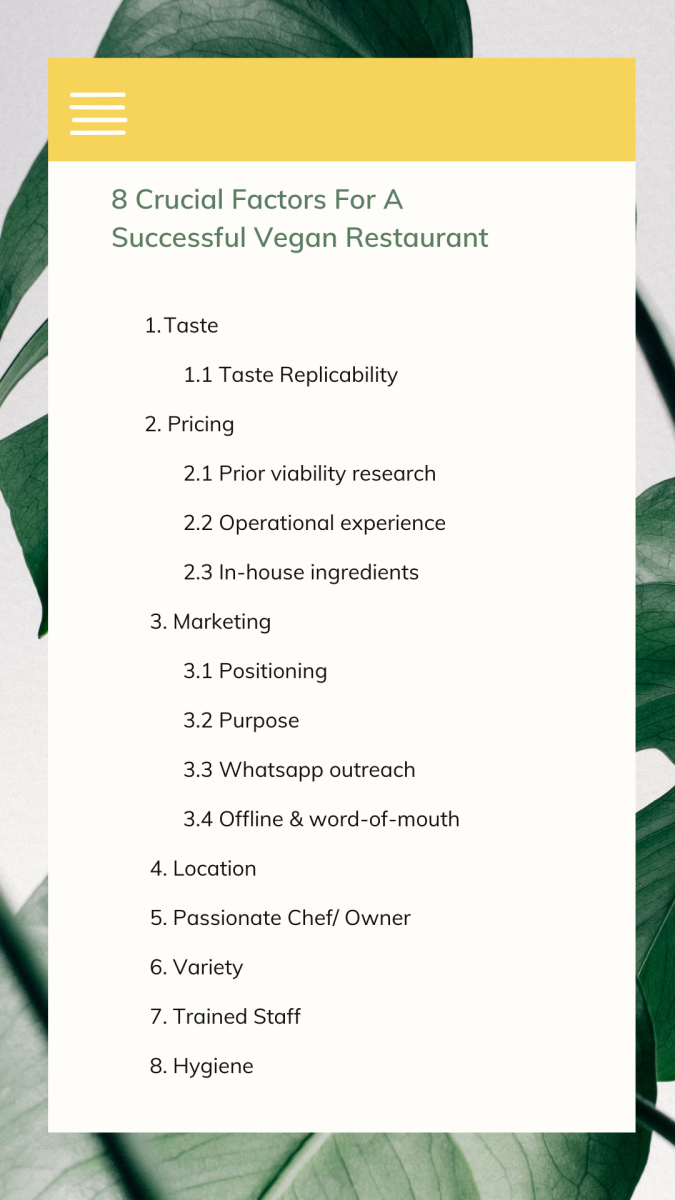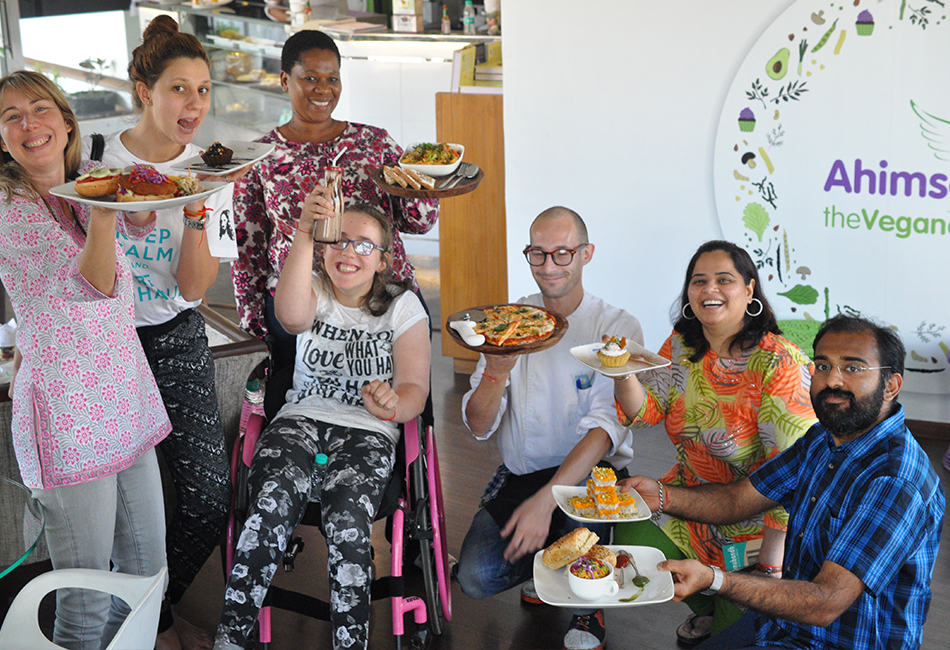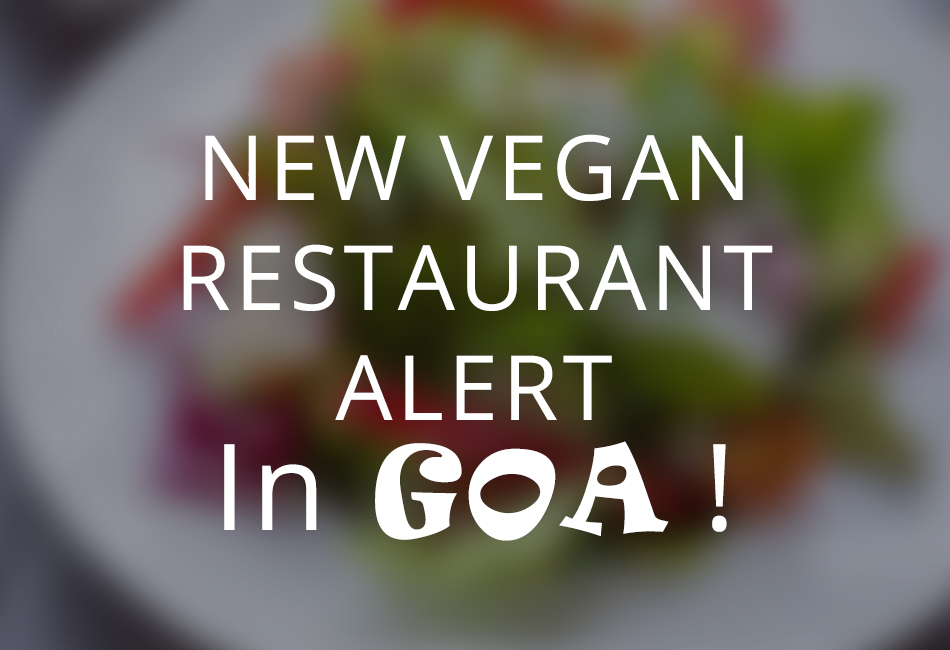Download Free Vegan Starter Kit -
1.png)
8 Crucial Factors for Launching a Successful Vegan Restaurant in India
30th October, 2023
Don’t we Indians love eating out? The magnitude of restaurant options is mind boggling. From regionally themed restaurants such as South Indian, Gujarati and Punjabi to international food and lifestyle-inspired restaurants like vegan-only, vegan-friendly, healthy, and meal-in-a-box, the diversity is phenomenal.
Speaking of the vegan restaurant segment specifically, it is fairly new and has started to take off mainly in the last 2 years. As Ken Spector, from the global vegan/vegetarian restaurant directory Happycow, says, “Of the 1551 restaurants currently listed on HappyCow from across India, 92 are vegan.” That is about 6%.
But there is enough potential for growth. As per a recent IMARC report, during the years 2022–2027, the vegan food market in India is anticipated to grow at a CAGR of 11.32%.
If you are planning to launch a vegan restaurant, you must keep the following factors in mind to ensure its success, as recommended by industry experts. Let’s dive in.
What do we mean by vegan restaurant?
Before we move on to the success factors, let’s agree on the definition of the term “vegan restaurant”. Broadly speaking, the vegan restaurant segment would cover both, vegan-only (i.e.100% vegan) restaurants and vegan-friendly restaurants.
Vegan-only restaurants are those that serve only vegan/plant-based, animal-free and cruelty-free menus such as Earth Cafe, Mumbai or Just Be cafe, Bengaluru. On the other hand, vegan-friendly restaurants are those that either have enough vegan items on the menu, or they flag the vegan-doable options, or better yet, have a separate vegan menu. This would include chains like Little Italy or Sante Spa Cuisine.
Unsurprisingly, vegan-friendly restaurants are more prevalent currently compared to vegan-only restaurants. In this article, we are going to discuss how to start and run a fully vegan restaurant successfully.

“Taste is king, price is queen for any vegan food/ restaurant brand,” says Siddharth Kothari, co-founder, Ahimsa VC.
Nitin Dixit, founder of Greenr, couldn’t agree more. For him, product, price and purpose (in this order) make up the 3Ps of success for a vegan restaurant. When he says product, he means taste, texture, presentation and all other related aspects.
If you want to go mainstream and succeed as a business, then you cannot compromise on the product and price. Product is the number one reason why anyone will become your customer. If the food doesn't taste good, then despite great ambience and service, repeat visits will not happen.
After 14 years in the restaurant industry, when co-founders Marzy Parakh and Kunal Gondalia were scoping out viable regional cuisines for their vegan restaurant, the number one criteria was that the cuisine should be replicable taste wise. Exactly as it is or even better with vegan substitutes. And that’s how after a lot of trial and error, they finalised on Gujarati cuisine for their immensely popular vegan restaurant in Mumbai: Green Gujarat.
Because their food tastes exactly the same as or better than traditional, original Gujarati food, they’ve never needed to tell people beforehand that their food is vegan. Only after a guest finishes their meal, do they reveal its truth. The reactions from non-vegans have ranged from pleasantly shocked to utter disbelief.
2. Price
Marzy from Green Gujarat insists that pricing should never be an entry barrier for people to try the food.
Siddharth from Ahimsa VC agrees. India is a price sensitive market, he says. People at the higher end too are somewhat price sensitive. Hence, as an investor, he gives pricing a lot of weightage, following taste. If a plant-based restaurant wants to charge higher prices, then it must justify that premium through the presentation, ambience and service.
Ideally, as Nitin from Greenr says, vegan restaurants must ensure that they aren’t priced significantly higher than their peer group of non-vegan restaurants. Only then will they get enough repeat customers.
2.1 Prior Viability Research
There is a common perception that since some vegan ingredients are more expensive than non-vegan ingredients, a vegan restaurant must be a fine-dining or high-end place. Siddharth from Ahimsa VC disagrees.
He has seen vegan health food and salad chains in the US that are very reasonably priced. In India, aren’t affordable restaurants selling chaats, authentic South Indian cuisine, etc. mostly vegan by default?
That is also why Gujarati cuisine was the chosen one for Green Gujarat. When Marzy and Kunal were studying viable concepts/cuisine options, they evaluated which cuisine allowed them to replicate most of the dishes using almost the same set of ingredients. They realised that most ingredients used in Gujarati dishes were anyway vegan, with only a few requiring substitution, such as ghee and curd.
2.2 Operational Experience
Marzy believes his more than a decade of operational experience running non-vegan restaurants equipped him to understand how to turn a vegan restaurant into profitable business. It trained him to deal with restaurant specific dynamics like food costing, operational viability, business aspect, etc.
For someone without relevant operational experience, Marzy suggests they start small as a home chef or with a delivery kitchen. They could also partner with an established restaurateur or do an internship at an existing restaurant.
Bean Me Up in Goa is a truly pioneering place, says Vikram Doctor, Food Writer. It is one of the first in India to manufacture its own tofu and still one of the few places to make its own tempeh and seitan.
Vikram continues, “Another vegan restaurant in South Goa, Cantine Indienne, have also taken the initiative to grow mushrooms on a commercial scale, which they both use in the restaurant and supply to other places.”
The happy by-product of this is that it opens up another revenue stream for the restaurant.
Green Gujarat too makes a lot of its own ingredients because that is one of the best ways to cut costs and help improve slim margins. It also helps reduce dependence on outside suppliers.
No vegan restaurant is going to operate in a vacuum. It has to compete with non-vegan, mainstream restaurants around. That is why when Vik Khatwani launched his iconic Earth Cafe in Mumbai, he launched it as a restaurant, not as a vegan restaurant.
He says, “We wanted people to come here for its food. Not because it was vegan. One of our long-time customers was shocked to find out that her favourite pepperoni pizza was, in fact, vegan pepperoni. It tasted so good and authentic.”
The same is true for Green Gujarat. Explaining their marketing strategy, Marzy said that they consciously positioned themselves as a vegetarian restaurant. (As did Nitin with Greenr). Doing so gets non-vegans through their doors. Because, at the current niche status of veganism, there is apprehension and a mindset that if it is vegan, it will be a substitute for the original and hence, compromised on taste. This prevents non-vegans from even giving it a try.
While the above examples positioned their restaurants as vegetarian, Vikram says, “Zest Cafe in South Goa positions itself more as a cool, alternative, chilled out place with lots of healthy options and it gets a lot of health conscious but also cool, younger crowd. The food is delicious and I think it's probably a more attractive place for not structuring its appeal on a primarily vegan message. They may want to deliver that, but by keeping the focus on being attractive first, they create a proposition with more appeal.”
International tip: If you wish to attract international clientele, then while listing on the vegan/vegetarian global review site, HappyCow, proudly position yourself as vegan.
Ken Spector from HappyCow explains, “Fully vegan restaurants are more appealing to our customer base, and fully vegan restaurants are listed closer to the top of search results. A fully vegan Indian restaurant will have a great advantage on HappyCow over a Pure Veg/Vegetarian restaurant as there are so few vegan Indian restaurants.”
3.2 Purpose
Nitin from Greenr considers Purpose the 3rd P of a successful vegan restaurant. The cause that prompted you to launch a vegan restaurant must come through in everything you do. It might even be a good image builder if the owners or executive team passionately talk about the restaurant’s purpose with the guests.
Take the example of South Goan plant-based restaurant Cantine Indienne. As Vikram explains, the owners of this restaurant are interested and willing to discuss the issues of veganism with anyone who’s interested.
A related interesting insight from Greenr’s Nitin was that people are a bit more forgiving of mistakes or minor lapse in service, if the restaurant is based on a purpose. And people might also be willing to pay up to ~15% more compared to restaurants that aren't aligned ethically or health wise.
As mentioned above, one of the preferred tips for marketing a vegan restaurant is to position it as a vegetarian restaurant. But that might leave your core TG of vegans wondering if they will find enough options there. Marzy from Green Gujarat’s simple solution for that is WhatsApp outreach. According to him, vegans are a well-knit group.
Most vegans in India are on at least one vegan WhatsApp group. Hence, he believes most vegans are just one message away. So while you position your restaurant as vegetarian in all your advertising and communication, keep the vegans on these 8-10 vegan Whatsapp groups in the loop.
Besides using social media for marketing, most vegan restaurants have seen success with offline marketing such as hosting events in-house, participating in external events, etc. Nitin from Greenr recommends exploring collaborations with aligned brands or influencers and also building community.
But by far, the factor with the most marketing impact is word-of-mouth. And at the risk of repetition, word-of-mouth happens automatically if the main product i.e. the food is worth talking about in the first place.
Word-of-mouth also covers reviews and ratings on restaurant review sites like Zomato or HappyCow. Ken from HappyCow explains “Restaurants with a rating of 4 or 5 stars perform better than those with 3 stars or lower. For restaurants with few ratings or that are new to the platform, it is recommended that owners and staff encourage customers to leave more reviews on HappyCow, especially those who have had positive experiences with the food, service, and ambience.”
Someone once said that the 3 most important success factors for a hotel are “Location. Location. Location.” To an extent, the same holds true for vegan restaurants too. Siddharth considers the proposed location as one of the main factors for investment evaluation.
He says, “If you open in a dying mall or in a location that doesn’t get good footfall, you are losing out on impulse visits or word-of-mouth. Most people have other good food options in their respective vicinity. They won’t move 10 extra kms, more so for a repeat visit, especially non-vegans.
That is why try to locate your plant-based restaurant in an upcoming area, if not a buzzing area.
Vikram has observed that normally, vegan-friendly restaurants put vegan items on the menu only if someone in the management or someone close to them is vegan.
Unless the owner or the chef are vegan and passionately so, they are not going to be able to do justice to the food and the business. Take the example of Green Gujarat. From a business perspective, it doesn’t enjoy margins as high as their non-vegan counterparts but because it is led by a co-founder who is an ardent, committed vegan, it forges ahead enthusiastically.
A passionate chef can make an outsized difference between a vegan restaurant simply surviving and one that has roaring success. When Vikram’s partner asked meat-heavy Cubebar’s chef to make a veggie burger, he was “mentally prepared for boring options like one with a veg cutlet or grilled mushrooms,” he shared.
“The Cubebar chef took it as a challenge to make a really tasty veggie burger and he produced it, mostly out of chickpeas. It’s still one of the best veggie burgers in Goa. The point is, a good chef should be able to make anything tasty,” he added.
Siddharth believes that a remarkable chef or owner would make it feel like someone is hosting you in their home, the way you would host guests - with warmth and care.
Post the COVID19 pandemic, this is a no-brainer. If you are opening a restaurant, be it vegan or otherwise, hygiene is an unofficial mandate. But it is more important for a vegan restaurant since the typical clientele is more evolved/discerning.
Ken from HappyCow says, “Many people who travel to India are concerned about the risk of getting sick from eating out. Restaurants can increase their chances of being chosen by customers by providing assurances of cleanliness and hygiene. Restaurants must figure out ways to show customers that their food and kitchen are clean and safe to eat from. Photos of a very clean-looking kitchen can help.”
Conclusion
Launching a vegan restaurant in India requires a deep understanding of the market, consumer preferences, location, effective marketing strategies but most importantly, great taste and flavours. By prioritising the factors outlined above, aspiring vegan restaurant owners can set themselves up for success and thrive in India’s diverse and dynamic food culture.
AUTHOR

trending
Be a Vegan First Informer
Send us buzzworthy news and updates
related
Explore
Contact Us
About Us
Stay Connected
Copyright ⓒ 2017-2023. VEGAN PASSION PRIVATE LIMITED. All Rights reserved.
For more information, please write to hello@veganfirst.com
Registered Office Address: 55, 2nd floor, lane 2, Westend Marg, Saidullajab, Near Saket Metro Station, New Delhi, Gadaipur, New Delhi South West Delhi, DL

2.png)

.png)

.png)
2.png)
2.png)
2.png)

1.png)



7.png)




